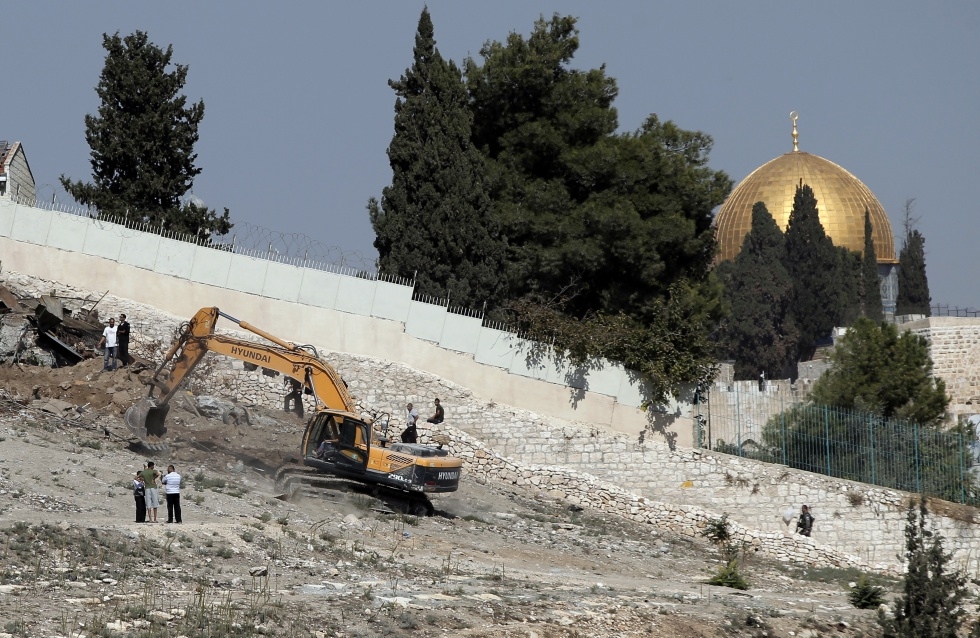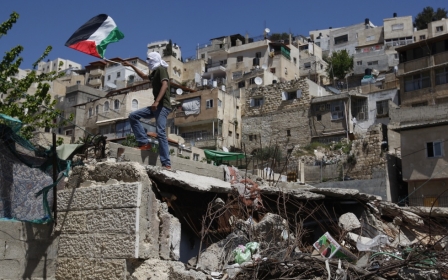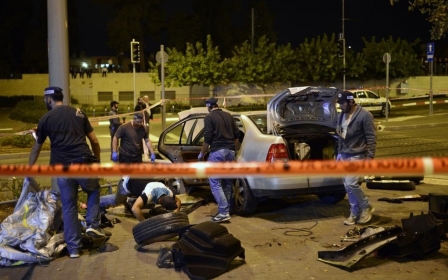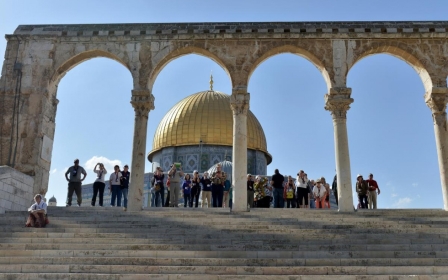The battle of Silwan

Three weeks ago, a few days after Jewish settlers took over 25 new apartments in the Palestinian neighborhood of Silwan, just south of Al Aqsa mosque in Jerusalem, a large advertisement appeared on the front page of "Haaretz" newspaper congratulating the new tenants on their "Zionist endeavor".
"The strengthening of Jewish presence in Jerusalem is our common challenge," went the ad. "With your settlement act, you make us proud."
The advertisement's content was not surprising, considering that it was sponsored by "Elad", an Israeli organisation that for years has advocated in favor of the Judaisation of Silwan - or "City of David", as they prefer to call it.
The surprise lay in the identity of those who signed up to the ad: Nobel Laureate Eli Wiesel; Shlomo Aharonishky, ex-chief of staff of the Israeli Police; and retired general Amos Yadlin, former head of intelligence in the Israeli Defense Forces and now an influential commentator and a possible future contender for the leadership of the Labor Party.
In short, not a bunch of right-wing lunatics but the flesh and bone of the Israeli establishment.
When Jewish settlement in Silwan began more than 20 years ago, the situation was totally different. Since its occupation of East Jerusalem in 1967, Israel has confiscated large pieces of land from their Palestinians owners in order to build large new neighborhoods for Jews only, while deliberately refraining from integrating Jews into dense Palestinian quarters.
A project for settling in Silwan, a village that became one of the poorest neighborhoods of East Jerusalem, was supported and sponsored by the then construction minister Ariel Sharon, but the plan was outside mainstream Israeli politics. The Labor Party protested against this move and the police ordered the settlers to leave the houses they had broken into on the grounds of fear for "public security". A few weeks later however were the settler allowed to return.
Silwan was attractive to proponents of Jewish settlement for two main reasons. The first is emotional and religious. The northern part of the neighborhood, adjacent to Al Aqsa/Temple Mount, sits on an archeological site that is commonly called 'City of David.' More than a hundred years of almost constant excavations have not revealed undisputed proof of King David's presence on the hill, but this has not deterred settlers and their followers from considering this area as the place where Jewish sovereignty began 3,000 years ago.
The second reason has to do with politics. The first settlers entered Silwan in October 1991, coinciding with the opening of the Madrid Conference, the first such meeting at which Israel was forced to sit face-to-face with a Palestinian delegation.
Settling inside populated neighborhoods at the heart of the Holy Basin surrounding the Old City was supposed to make sure that Jerusalem would not be divided into Palestinian and Israeli parts, and, if divided, ensure that the Old City would remain in Israeli hands.
The fact that Silwan was at the center of the Palestinian uprising in Jerusalem known as the First Intifada, which started in late 1987, also helped to make it a target for tighter Israeli control.
With Itzhak Rabin's government in 1992 and the Oslo agreements that followed, the division of Jerusalem between Israel and a future Palestinian state became a much more relevant option and the Silwan settlers were pushed into a political corner.
They continued to try to buy new houses and apartments, investing millions of dollars in shady deals, but their successes were limited.
Then, at the end of the 1990s, the settlers, headed by the Elad organisation, came up with a better idea: instead of leading a frustrating battle from house to house, which portrayed them as right-wing extremists, they decided to make the issue of the City of David/Silwan into a national matter, around which broad consensus could be achieved.
Elad's idea was to use the Jewish historical attachment to the City of David for its own political aims. It took over management of the City of David National Park (part of the Jerusalem Walls National Park), which sits on the archeological site at the northern part of Silwan through secret deals with government authorities. It then began investing tens millions of dollars in excavations, sophisticated audiovisual effects, and exit tunnels dug under the houses of Palestinian Silwan.
As a result, the national park of the City of David, under direct settler management, became one of the most popular sites in Israel, with hundreds of thousands of visitors each year.
Archeology also served a much greater aim. Through their control over the national park, the settlers dramatically widened their sway over Silwan. Palestinians living there were put under growing pressure, their movement became limited, and privately-paid security guards, sponsored by the government but controlled by the settlers, made their lives impossible.
Above all, making City of David/Silwan into a Jewish "national heritage" site legitimized the settlers' activity there in a way not previously possible. It allowed them also to penetrate Israel's state apparatus. The present head of the National Park Authority, responsible for the City of David park, has served on the board of Elad. The new chairman of the Archeological Council carried out the archaeological digging in Silwan. The general manager of the Tourism Ministry is a senior Elad member.
For many Israelis, including some in the center and center-left, Silwan is now poised to become part of Israeli Jerusalem, if and when a separation will come about. The respectable list of names on Elad's ad is part of this change.
At the same time, the settlers in Silwan have not given up their expansion plans. Encouraged by their new and widening legitimization, they have renewed their efforts to buy new houses from Palestinian owners. It is difficult to esteem how many of such deals have actually been completed.
There is an unequivocal Palestinian taboo against selling property to Jewish hands, and the Palestinian Authority is vehemently opposed to it. But Ramallah is far away (in influence not in kilometers), especially after the building of the separation wall around East Jerusalem, and it is clear that some Palestinians do surrender to pressures and to high sums of money offered to them and agree to sell.
Jewish activists in East Jerusalem boast that they have bought hundreds of apartments from Palestinians and they just are just waiting for the right moment to move in to them. No one knows how much truth there is in such statements. What is clear is that in the beginning of October the settlers decided to move into apartments bought some time before.
This takeover, so close to the walls of Al Aqsa, seems inevitably linked to the mounting pressure of right-wing Jewish organisations to change the status quo on Temple Mount.
The movements for the rebuilding of the Third Temple are not directly connected to the settlers' organisations in Silwan, but the motivation is similar: to affirm Israeli sovereignty over the very heart of Jerusalem at a time when this sovereignty is in question, either from part of the international community or from Jerusalemite Palestinians who have staged a mini-Intifada for almost four months.
On the issue of the future of Jerusalem, thanks in part to the settlers' efforts in "normalizing" Israeli control over East Jerusalem, there is a wide agreement in israeli society. It is not by chance that "defending Jerusalem" became one the main themes of Prime Minister Benjamin Netanyahu's shift to the right, evident in his speech to the Knesset at the beginning of last week.
From this point of view, the combined moves - on Temple Mount, or Haram al-Sharif as it is known to the Palestinians, and in Silwan - had an immediate political effect. The declaration by Uri Ariel, a senior minister from the Jewish Home party, about his intention to move to Silwan is part of the same trend.
The price has been the heightening of tensions in Jerusalem to a dangerous point. Israel believes it can contain these tensions. It may be proved wrong.
Photo credit: Israeli security forces secure an excavator after Israel ordered the demolition of Palestinian sheds in the annexed Arab east Jerusalem neighbourhood of Silwan, on October 29, 2014.
New MEE newsletter: Jerusalem Dispatch
Sign up to get the latest insights and analysis on Israel-Palestine, alongside Turkey Unpacked and other MEE newsletters
Middle East Eye delivers independent and unrivalled coverage and analysis of the Middle East, North Africa and beyond. To learn more about republishing this content and the associated fees, please fill out this form. More about MEE can be found here.





